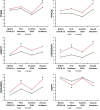Impaired wound healing is associated with poorer mood and reduced perceived immune fitness during the COVID-19 pandemic: A retrospective survey
- PMID: 35949670
- PMCID: PMC9358545
- DOI: 10.1002/hsr2.764
Impaired wound healing is associated with poorer mood and reduced perceived immune fitness during the COVID-19 pandemic: A retrospective survey
Abstract
Background and aims: The coronavirus disease-2019 (COVID-19) pandemic disrupted medical care of patients with chronic wounds, and in combination with other negative effects of lockdown measures, this may have a negative effect on mood and quality of life. Until now, the consequences of the COVID-19 pandemic and associated lockdowns for individuals with impaired wound healing have not been investigated.
Methods: An online survey was conducted to evaluate perceived immune fitness, mood, and health, both before and during the COVID-19 pandemic.
Results: Of the 331 Dutch pharmacy students that completed the survey, N = 42 participants reported slow healing wounds and/or wound infection and were allocated to the impaired wound healing group; the other N = 289 participants served as control group. The survey assessed mood, perceived immune fitness, and health correlates for (a) the year 2019 (the period before the lockdown), (b) the first lockdown period (March 15-May 11, 2020), (c) summer 2020 (no lockdown), and (d) the second lockdown (November 2020-April 2021). The analysis revealed that negative mood effects, reductions in quality of life, and perceived immune fitness during the two lockdowns were significantly more pronounced among individuals that reported impaired wound healing compared to the control group. The effects on mood, perceived immune fitness, and health correlates were most pronounced for the second lockdown period.
Conclusion: The COVID-19 pandemic is associated with significantly poorer mood, quality of life, and reduced perceived immune fitness. These effects are significantly more pronounced among individuals with self-reported impaired wound healing.
Keywords: COVID‐19; mood; perceived immune fitness; slow healing wounds; wound infection.
© 2022 The Authors. Health Science Reports published by Wiley Periodicals LLC.
Conflict of interest statement
Over the past 3 years, J.C.V. has acted as a consultant/advisor for KNMP, Mentis, Red Bull, Sen‐Jam Pharmaceutical, and Toast!. J.G. is part‐time employee of Nutricia Research and received research grants from Nutricia research foundation, Top Institute Pharma, Top Institute Food and Nutrition, GSK, STW, NWO, Friesland Campina, CCC, Raak‐Pro, and EU. The other authors have no potential conflicts of interest to disclose.
Figures



Similar articles
-
The Impact of COVID-19 Lockdowns in Germany on Mood, Attention Control, Immune Fitness, and Quality of Life of Young Adults with Self-Reported Impaired Wound Healing.J Clin Med. 2023 Apr 29;12(9):3205. doi: 10.3390/jcm12093205. J Clin Med. 2023. PMID: 37176643 Free PMC article.
-
Living Alone or Together During Lockdown: Association with Mood, Immune Fitness and Experiencing COVID-19 Symptoms.Psychol Res Behav Manag. 2021 Dec 3;14:1947-1957. doi: 10.2147/PRBM.S332853. eCollection 2021. Psychol Res Behav Manag. 2021. PMID: 34887688 Free PMC article.
-
Alcohol Consumption Patterns during COVID-19 Lockdown and Their Relationship with Perceived Immune Fitness and Reported COVID-19 Symptoms.Healthcare (Basel). 2021 Aug 13;9(8):1039. doi: 10.3390/healthcare9081039. Healthcare (Basel). 2021. PMID: 34442176 Free PMC article.
-
Insomnia Complaints and Perceived Immune Fitness in Young Adults with and without Self-Reported Impaired Wound Healing.Medicina (Kaunas). 2022 Aug 4;58(8):1049. doi: 10.3390/medicina58081049. Medicina (Kaunas). 2022. PMID: 36013516 Free PMC article.
-
The Assessment of Immune Fitness.J Clin Med. 2022 Dec 20;12(1):22. doi: 10.3390/jcm12010022. J Clin Med. 2022. PMID: 36614822 Free PMC article. Review.
Cited by
-
Emotion Regulation and Mood during the COVID-19 Pandemic.J Clin Med. 2023 Apr 7;12(8):2758. doi: 10.3390/jcm12082758. J Clin Med. 2023. PMID: 37109095 Free PMC article.
-
Sex and age differences in self-reported immune fitness.Brain Behav Immun Health. 2024 May 3;38:100792. doi: 10.1016/j.bbih.2024.100792. eCollection 2024 Jul. Brain Behav Immun Health. 2024. PMID: 38737965 Free PMC article.
-
The Impact of COVID-19 Lockdowns in Germany on Mood, Attention Control, Immune Fitness, and Quality of Life of Young Adults with Self-Reported Impaired Wound Healing.J Clin Med. 2023 Apr 29;12(9):3205. doi: 10.3390/jcm12093205. J Clin Med. 2023. PMID: 37176643 Free PMC article.
-
Dual action of epigallocatechin-3-gallate in virus-induced cell Injury.J Genet Eng Biotechnol. 2023 Nov 28;21(1):145. doi: 10.1186/s43141-023-00624-4. J Genet Eng Biotechnol. 2023. PMID: 38012348 Free PMC article.
References
-
- Unterfrauner I, Hruby LA, Jans P, Steinwender L, Farshad M, Uçkay I. Impact of a total lockdown for pan‐demic SARS‐CoV‐2 (Covid‐19) on deep surgical site infections and other complications after orthopedic surgery: a retrospective analysis. Antimicrob Resist Infect Control. 2021; 10: 1‐9. - PMC - PubMed
-
- Emanuel EJ, Persad G, Upshur R, et al. Fair allocation of scarce medical resources in the time of Covid‐19. N Engl J Med. 2020; 382: 2049‐2055. - PubMed
-
- Laux CJ, Bauer DE, Kohler A, Uçkay I, Farshad M. Disproportionate case reduction after ban of elective surgeries during the SARS‐CoV‐2 pandemic. Clin Spine Surg. 2020; 33: 244‐246. - PubMed
LinkOut - more resources
Full Text Sources
Miscellaneous

